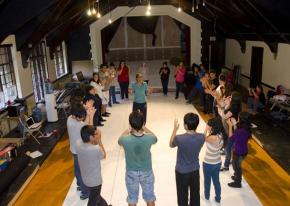The voices of immigrant youth
reviews a new play written and performed by Chicago youth about their experiences with immigration, racism and deportation.
THE STORIES of a young Arab "dreamer," a father haunted by the possibility of being forever separated from his family, a young man invigorated by immigrant rights protests, and two sharp, old nuns who are the last people seen by busloads of immigrants before they are deported all share the stage in Home/Land, the newest production from a youth theater group in Chicago's Albany Park neighborhood.
Written and performed by immigrant youth with the help of a talented and nurturing directorial staff at the Albany Park Theater Project, Home/Land takes on no less a subject than the myriad, multi-colored stories of immigrants in America today.
But what makes this play particularly compelling, and what likely accounts for so much of its brutal honesty, is that at least half of the young people performing it are themselves embroiled in the struggle of immigration today. They are either undocumented themselves, or live in a family with members who have uncertain immigration positions, or are friends with someone whose status keeps them out of college and the kinds of jobs that high schoolers dream of having.

With almost 400,000 immigrants deported in 2011 alone, the number of people touched by the broken immigration system continue to grow. Meanwhile, however, immigrants themselves continue to strive--for a daily wage, for the chance to celebrate their daughter's Quinceañera, for the chance to go to university or take a dream job.
Home/Land brings these dreams, and the pain of these ideas broken by deportation, seamlessly together. An incarcerated father meets his son through the plexiglass window of a door, which falls toward the father the more the young son's need to see his dad grows.
The play also doesn't shrink from some of the less glamorous effects of running from the immigration system--a mother speaks about the toll it has taken on her family, having to constantly pretend that her husband hasn't crossed the border to return to their family.
THE PLAY is based on real stories in Chicago and, watching it here, it is steeped with the city's history. The neighborhood of Albany Park, what the Chicago Sun-Times called the "gateway for the world" neighborhood, is as diverse as the stories told in Home/Land. On the walk to the theater, I passed a mosque, a Catholic church and a group of Chinese speakers, all in the short walk from the train.
And because each of the stories comes from an immigrant in Chicago, told in interviews with the young actors who then wrote them into a performance, an extra layer is added to the life running through the veins of the play. You can find many news reports about Father Jose Landaverde and his hunger strikes to stay the deportation of a member of his community. But the path that took him from being an orphaned guerrilla to becoming the priest of an activist church had remained untold until now.
The play uses a mixture of tragedy and satire to tell its stories. When a character is caught by immigration authorities (played by two tall actors dressed in what approximates for riot gear), they are literally swept off their feet by the force of the bureaucracy.
For those touched by this iron fist, finding out that an undocumented person you know has been picked up by the police, by border patrol or any other agency is quite literally like having the floor pulled out from under your feet.
At other times, the dark humor is right on point. In a show called "Who Wants to Be an American?" complete with a game show host called Bob Whiteman, a young man named Marcos tries to do everything right to get to the final round--citizenship.
In the first round, the young immigrant has to play musical chairs with an American citizen, but when it comes time to sit down, Whiteman's assistant stops him from getting anywhere near the chair. The American citizen is congratulated, beamed at and given a glass of lemonade for her troubles.
Meanwhile, against all odds, Marcos makes it almost to the end of the game show, until he is stopped for driving over the speed limit. Because he has no immigration papers, Marcos also has no license. And because he has no license, Marcos is placed into deportation proceedings.
Chicago was one of the central places of the DREAM Act movement, as well as the birthplace Coming Out of the Shadows marches in which youth declared their undocumented status to force mainstream society to recognize their place in the U.S..
And, unsurprisingly both for the youth themselves and also the rich history of the immigrant rights movement in Chicago, the protest scenes in Home/Land are some of the most moving. After watching the emotionally tortuous journeys of hope, pain, separation and again hope, these become a heart-lifting show of action.
In one of the final scenes, the young actors march to a beat created only with their feet and their hands as videos of previous youth marches in Chicago play on small television screens embedded in the set. The people the actors portray and the families of the young actors themselves built their lives in America, despite the punitive immigration system, with their own two hands.
By ending the play with the music of a march made by the clapping hands and stomping feet of the young actors, Home/Land reminds us that to end the dehumanizing immigration system, what we need are our clapping hands, stomping feet and ability to come together.


